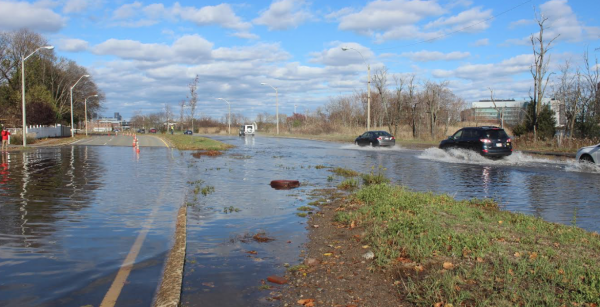August 3, 2022

A flooded-out boulevard in 2018. Reporter file photo
A bill that would borrow and spend $11.3 billion on Massachusetts transportation projects survived the last-minute frenzy of deal-making on Beacon Hill over the weekend and into Monday, with a number of Dorchester projects tucked into it.
The bill landed on Gov. Baker’s desk on Sunday as lawmakers in the House and Senate shuttled legislation between branches and the governor’s office in the waning days of the formal session. The governor issued a statement saying he is reviewing the transportation project legislation.
“There were certainly people burning the midnight oil,” said state Rep. Dan Hunt of Dorchester.
The transportation bill includes the creation of a special commission to study the Morrissey Boulevard corridor, which is seeing a development boom involving apartment towers and life science buildings as climate change, in the form of rising sea levels, threatens the thoroughfare. Even on sunny days, Morrissey is prone to tidal flooding, and policymakers have spent years going back and forth on how to remedy the problem.
State Sen. Nick Collins, who represents Dorchester and South Boston, said the commission is needed due to the number of entities that have jurisdiction throughout the corridor as it faces infrastructure and climate resiliency needs amid the development surge.
“This is to bring everyone to the table and to stay at the table to get these big issues done,” he said.
The commission, expected to assemble later this year and report on its findings and recommendations by June 2023, will convene the heads of various state agencies and the mayor of Boston or their designees, as well as local lawmakers. Under the bill, the commission is tasked with recommending improvements for pedestrians, drivers, and public transit users, as well as strengthening the “climate resiliency” of Kosciuszko Circle.
State Rep. Brandy Fluker Oakley noted that the bill also includes $50 million for the electrification of the MBTA’s Fairmount commuter rail line, which includes a half dozen stops in Dorchester and Mattapan. She filed the amendment with Rep. Liz Miranda and state Sen. Collins.
“If we’re able to move toward electrification and away from diesel, it’s better for the environment and provides more frequency of service in the corridor,” Fluker Oakley said.
The bill also sets aside:
• $2m for repairs to the Fields Corner MBTA station;
• $2m for an elevated median on Gallivan Boulevard between Neponset Circle and Adams Street;
• $1m for a “greenway” above the tunnel between Talbot Avenue and Park Street;
• $1m for a study of a potential sound barrier to quiet noise from Red Line tracks between Savin Hill MBTA Station and McConnell Park;
• $750k for lighting, noise reduction, and safety improvements to the parking lot adjacent to JFK/UMass Station and under the Southeast Expressway;
• $250k for improvements to the tide gates on Morrissey Boulevard at Patten’s Cove.
The bill also includes $400 million for the MBTA as the public transit agency faces increased federal scrutiny over safety issues. One of the provisions calls for more MBTA safety reports.
The legislation sets out $6.9 million for fare-free bus pilot programs for the MBTA and the regional transit authorities elsewhere in Massachusetts to administer, an expansion of a pilot pushed by Mayor Michelle Wu.
Joining the transportation bill on its way to the governor’s desk were bills increasing access to mental health supports, legalizing sports betting in Massachusetts, reforming the cannabis sector in part by helping cities and towns authorize marijuana cafes, and implementing new climate and clean energy policies.
Fluker Oakley said she was pleased to see the mental health bill cross the finish line, since it included two of her proposals: When someone is having a mental health crisis and calls 911, a mental health professional will be dispatched instead of law enforcement, and when someone who is incarcerated is put on mental health watch for 72 hours, they can petition a court for transfer into treatment.
The late onslaught of bills came after Baker signed a $52.7 billion annual state budget, with just a few vetoes.
One major piece of legislation failed to make it to his desk: A $4 billion economic development bill that skidded off the runway after the discovery of a long-forgotten 1986 law that would create $3 billion in relief for taxpayers.
The Republican Baker has said that the state can afford to do both the bill, which offered a variety of tax relief measures totaling $1 billion, as well as fulfill the aim of the 1986 law, but the Legislature’s Democratic leaders balked, citing a potential economic downturn.
That bill included $5 million for the Dorchester Fieldhouse, a $55 million project spearheaded by two local nonprofits, the Martin Richard Foundation and the Boys and Girls Clubs of Dorchester. The bill would have also set aside $8 million for the Harvard Street Neighborhood Health Center to plan and build a new “state of the art” health center in Dorchester, and $144,000 for increased salaries for nurses and other staffers at the Mattapan Community Health Center.
Aspects of the economic development bill could still move through the Legislature, though it would likely be through informal sessions, when just one member can scuttle a piece of legislation.
“I’m optimistic something will happen,” Fluker Oakley said.
Material from State House News Service was used in this report.


